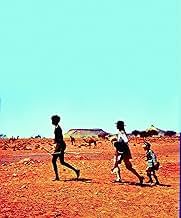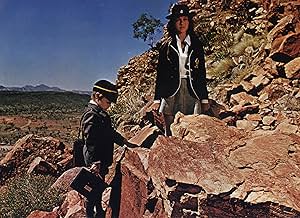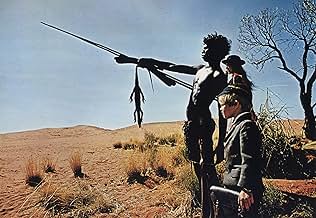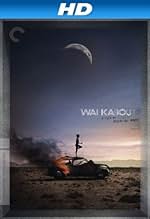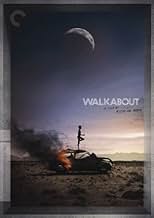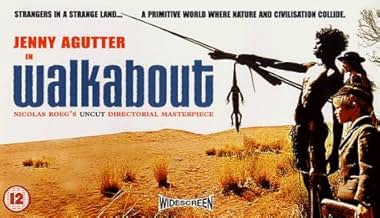Un frère et une soeur sont abandonnés dans le bush australien, obligés de s'en sortir seuls. Ils rencontrent un garçon aborigène en plein "Walkabout", un rite de séparation de sa tribu.Un frère et une soeur sont abandonnés dans le bush australien, obligés de s'en sortir seuls. Ils rencontrent un garçon aborigène en plein "Walkabout", un rite de séparation de sa tribu.Un frère et une soeur sont abandonnés dans le bush australien, obligés de s'en sortir seuls. Ils rencontrent un garçon aborigène en plein "Walkabout", un rite de séparation de sa tribu.
- Réalisation
- Scénario
- Casting principal
- Récompenses
- 1 victoire et 1 nomination au total
- Black Boy
- (as David Gumpilil)
- Man
- (as Robert McDara)
- No Hoper
- (as Pete Carver)
- German Scientist
- (as Noelene Brown)
- Radio Announcer
- (voix)
- (non crédité)
Avis à la une
The experiences between these three young people form the balance of this excellent film. The culture clash is immediate, as the two urbanized white kids struggle to make themselves understood by the aborigine. But they ultimately become rather inseparable.
Along the way, they encounter all sorts of flora and fauna. "Walkabout" is highly noteworthy for its respect for Nature, and is filled with many visual wonders. Given that director Nicolas Roeg had been a camera operator and cinematographer, it's no surprise that the film *looks* beautiful, and it's set to a haunting and lovely John Barry score.
Three highly engaging performances anchor the film. Agutter has a naturally sexy presence, and Roeg doesn't miss opportunities to let the camera take in every aspect of her body. His son does a nice job as the brother, avoiding being overly cutesy and always relaxed on screen. Gulpilil proved to be a real find in his film debut. Another Aussie favourite, John Meillon, appears briefly as the white kids' father.
"Walkabout" was largely improvised. The Edward Bond script, based on a novel by Donald G. Payne, was actually only 14 pages or so. Knowing this, it makes the acting that much more impressive, as the cast react instinctively to the scenes & settings.
Overall, this is one of *the* iconic Australian films, and is a must-see for movie lovers interested in cinema from this part of the world.
Eight out of 10.
The film is about nature, and man's relationship with it. If a civilised person were left out in the desert, then they would soon die. But, as this film shows, there are people and creatures living out there quite happily.
The film has been criticised for having a weak beginning and a weak end. But where does the story of this film start? And where and when would you end it? Yes you can end it when the two children get back to civilisation. But does the story end there? No. Because of their experiences, things are never going to be the same again. And for them, the story has not finished, it is only just beginning.
I have seen this film several times and I notice something different every time I see it.
Le saviez-vous
- AnecdotesLuc Roeg was actually sun-burnt in the scene where the aboriginal boy treats his back by rubbing him with fat from a wild boar. Director Nicolas Roeg thought it would make a good scene for the film so he picked up the camera and shot it.
- GaffesThe credits name the actor playing "Black Boy" as David Gumpilil. It should be David Gulpilil.
- Citations
Narrator: [last lines - from "Poem XL" by A.E. Housman's "A Shropshire Lad"] Into my heart an air that kills, From yon far country blows: What are those blue remembered hills, What spires, what farms are those? That is the land of lost content, I see it shining plain, The happy highways where I went, And cannot come again.
- Crédits fousAfter the credits, there is a flash of white light on the screen and as it becomes a black screen, radio tuning is heard while the words "rien ne va plus" are shown.
- Versions alternativesA director's cut of this movie was released in 1997 with 5 additional minutes. This cut is identical to the original British release version (100 minutes): the film was shortened by five minutes for its original American release.
- ConnexionsEdited into Terror Nullius (2018)
- Bandes originalesElectronic Dance
Written and performed by Billy Mitchell
Meilleurs choix
- How long is Walkabout?Alimenté par Alexa
Détails
- Date de sortie
- Pays d’origine
- Langues
- Aussi connu sous le nom de
- Encuentro de dos mundos
- Lieux de tournage
- Sociétés de production
- Voir plus de crédits d'entreprise sur IMDbPro
Box-office
- Budget
- 1 000 000 $AU (estimé)
- Montant brut mondial
- 1 888 $US


